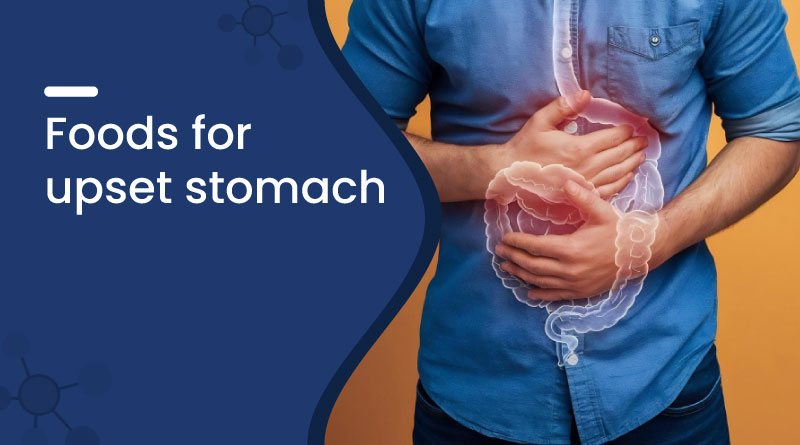Best Foods for Upset Stomach Relief – What to Eat When Nauseous


An upset stomach or dyspepsia can strike unexpectedly, whether it's due to food poisoning, indigestion, stress, or a viral infection. The discomfort it brings, such as bloating, nausea, cramping, or diarrhea, can disrupt your day and appetite. This blog explores the best foods to eat during an upset stomach, what to avoid, and essential tips to restore your gut balance naturally.
What Causes an Upset Stomach?
An upset stomach can result from a mix of diet, habits, and underlying health conditions. Understanding these causes can help you manage and prevent future episodes.
- Dietary Factors: Eating too quickly, overeating, or consuming fatty, spicy, or greasy foods, excessive alcohol, caffeine, or carbonated beverages can all contribute.
- Lifestyle Factors: Smoking, anxiety, depression, and being overweight can also play a role.
- Medical Conditions: Conditions like acid reflux, peptic ulcers, gallstones, or even the stomach flu can cause persistent indigestion.
Symptoms of an Upset Stomach
Before diving into food choices, it helps to recognize the common signs of digestive distress:
- Nausea or vomiting
- Bloating and gas
- Abdominal pain or cramps
- Loose stools or diarrhea
- Loss of appetite
Also read - Medicine for stomach pain in India
Best Foods for an Upset Stomach
1. Carbohydrates (Easy-to-Digest Energy Sources)
During an upset stomach, your body benefits from foods that are easy to digest and light on the digestive system. Simple, low-fiber carbohydrates provide quick energy, minimize irritation, and are easier to tolerate when your appetite is reduced.
- White rice
- Boiled potatoes
- Toast (preferably plain or lightly buttered)
- Plain crackers
- Steamed idlis
- Khichdi (light, non-spicy)
2. Electrolyte-Rich Foods (Rehydration and Mineral Balance)
Vomiting or diarrhea can lead to dehydration and a loss of vital minerals like sodium, potassium, and magnesium. Foods and drinks rich in electrolytes help replenish lost minerals, reduce fatigue, and maintain healthy muscle and nerve activity.
- Coconut water
- Bananas
- Clear vegetable or chicken broth
- Oral Rehydration Solutions (ORS – homemade or packaged)
3. Soluble Fiber (Supports Bowel Regulation)
Soluble fiber absorbs water and turns into a gel-like substance in the gut, which helps slow down digestion and ease diarrhea. It also nourishes beneficial gut bacteria and supports regular bowel movements.
- Applesauce
- Ripe bananas
- Cooked carrots
- Oatmeal (plain, without milk or sugar)
4. Protein (Tissue Repair and Immune Support)
Protein is essential for repairing tissues and supporting immune function, especially if the body is recovering from an infection or inflammation. During stomach upset, mild and non-fatty protein sources are preferred to avoid digestive strain.
- Moong dal
- Steamed or boiled eggs
- Plain yogurt or curd (if tolerated)
- Soft paneer
5. Probiotics (Restore Gut Health)
Probiotics are beneficial bacteria that help restore the natural balance of the gut microbiome. This is especially helpful after a stomach infection or antibiotic use, as they support digestion and reduce inflammation.
- Plain yogurt or curd
- Buttermilk (chaas, unsweetened and mildly spiced with cumin)
- Homemade fermented rice water or kanji (if accustomed)
Foods to Avoid During an Upset Stomach
Certain foods can worsen symptoms or delay recovery. Try avoiding:
- Fried and greasy foods: These are hard to digest and can trigger nausea or diarrhea.
- Dairy products: Especially if you're lactose-intolerant or sensitive, dairy can increase bloating and gas.
- Caffeinated drinks: Coffee, cola, and energy drinks can irritate the stomach lining and increase acidity.
- Spicy foods: Chili, pepper, and strong spices can aggravate the gut.
- Citrus fruits: Oranges, lemons, and grapefruit may worsen acidity or discomfort.
Role of Hydration for Faster Recovery
In any digestive upset, hydration is just as important as food. Sip water slowly throughout the day. Oral rehydration solutions (ORS), coconut water, or clear soups can help prevent dehydration and restore electrolyte balance.
When to Seek Medical Help?
Most cases of an upset stomach are mild and improve within a day or two with rest and dietary care. Still, you should consult a doctor if you notice any of the following symptoms:
- Continuous vomiting or diarrhea that continues for more than two days
- Signs of dehydration (dry mouth, dizziness, reduced urination)
- High fever
- Blood in stool or vomit
- Severe or worsening abdominal pain
Conclusion
An upset stomach, though uncomfortable, is usually a short-term problem. Eating bland, easy-to-digest foods and staying hydrated can significantly ease symptoms. Avoid irritants, listen to your body, and give your digestive system time to heal. Simple dietary choices can make a big difference in how quickly you recover.
Frequently Asked Questions (FAQs)
Q. How long does an upset stomach usually last?
A. Mild cases typically last 1–2 days. If symptoms persist beyond 48 hours or worsen, it's best to consult a doctor.
Q. What are the causes of an upset stomach?
A. Dietary factors like overeating, eating spicy or greasy foods, and excessive alcohol can lead to an upset stomach. Lifestyle habits and health issues can also contribute.
Q. Are bananas good for an upset stomach?
A. Yes, ripe bananas are easy to digest, help replenish potassium, and can firm up loose stools.
Q. What should kids eat during an upset stomach?
A. Provide gentle, easy-to-digest foods such as plain rice, ripe bananas, moong dal, and curd, and make sure they are well hydrated.
Bacillus Clausii 2 billion per 5 ml.
Lactobacillus Sporogenes (100Million spo...










 Added!
Added!